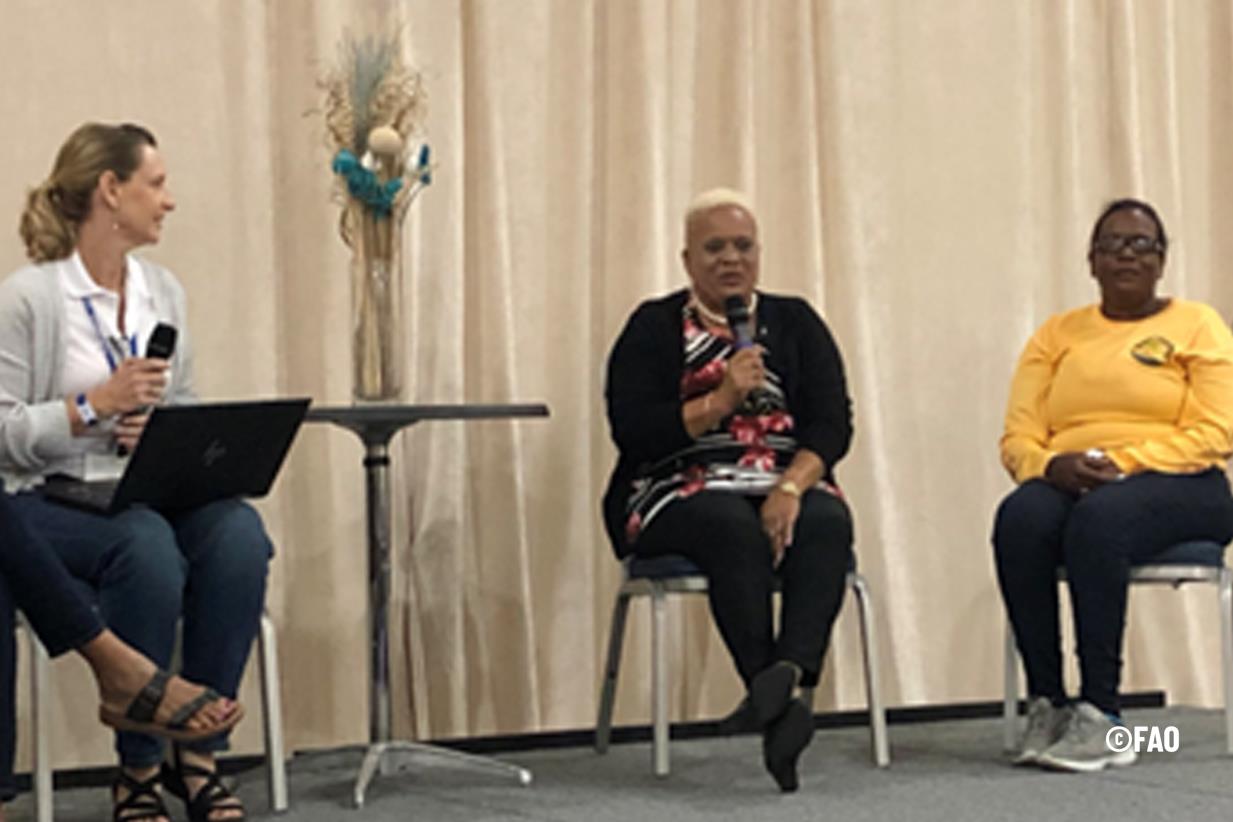The Western Central Atlantic Fishery Commission (WECAFC) hosted the first Regional Women in Fisheries Forum to celebrate the International Year of Artisanal Fisheries and Aquaculture

©FAO
The Western Central Atlantic Fishery Commission's ongoing celebration of the International Year of Artisanal Fisheries and Aquaculture held the first Regional Women in Fisheries Forum (RWIFF) on 6 November 2022. The forum was held on the margins of the 75th meeting of the Gulf and Caribbean Fisheries Institute in Destin Fort-Walton Beach, Florida. The theme for the forum was, “We are not invisible: celebrating, empowering and supporting women in fisheries” and sought to highlight the multi-dimensional roles women play in fisheries and aquaculture and identify pathways to better support women. The meeting was held in a hybrid format, in-person and online, with more than 50 participants, including male and female, from 19 countries.
This RWIFF fell within one of the sub-themes of the IYAFA 2022 within the region of gender and youth and the overall theme of the celebration, Recovery and Resilience. Regional representatives led the preparation of the forum, including the Caribbean Regional Fisheries Mechanism Secretariat (CRFM), Caribbean Network of Fisherfolk Organizations (CNFO), University of West Indies – Centre for Resource Management and Environment Studies (UWI-CERMES), Wildlife Conservation Society – Belize (WCS), SAEDI Consulting (Barbados) Inc., and the WECAFC Secretariat.
The central objectives of the forum were threefold: (1) Empower and celebrate women in fisheries along the value chain; (2) Discuss the unconscious biases women face in fisheries and identify areas for improvement to empower women better; and (3) Highlight the diversity of work being carried out by women.
Renata Clarke, Sub-regional Coordinator, The Food and Agriculture Organization of the United Nations (FAO), noted in her opening remarks that, “Only recently in Latin America and the Caribbean has women’s diverse role in small-scale fisheries and aquaculture been recognized. She further noted that this first regional ‘Women in Fisheries’ forum presented a venue for the region to integrate better and institutionalize elements of the Sustainable Development Goals 5 (gender equality) and 14.7 (increase the economic benefits to Small Island developing States from the sustainable use of marine resources) and the Voluntary Guidelines for Securing Small-Scale Fisheries in the Context of Food Security and Poverty Alleviation”.
The forum combined multiple forms of engagement, including presentations on the integration of gender equity in regional and international instruments and how these instruments are being operationalized at the national level. The forum also included a panel discussion of women from across the region, including Belize, Barbados, Mexico, and the United States of America. In this panel, women discussed the challenges they continue to face within the fisheries and aquaculture industries. These challenges included a continued lack of recognition of their voices at the policy-level, limited opportunities for capacity development such as financial planning and value-adding to the products. Notably the women highlighted the lack of insurance infrastructure within their regions to support them in the event of an emergency. However, the women also highlighted opportunities and solutions to these challenges including the need for a coordinated regional effort to mainstream gender in fisheries and aquaculture policy and greater recognition of the diversity of roles women play in the sectors. Indeed, the panel highlighted that women are not only fish processors, but are boat owners, boat captains, fisheries administrators, and fish processors.
In describing the importance of women in fisheries, Sylvia White, a fish processor from Barbados, said, “The Regional Women in Fisheries Forum gave me a wealth of knowledge and a zeal to keep pushing for the equality of women and the small-scale fishers in the industry to safeguard our participation and engagement, so we can sit at the high-level table with the decision-makers. It was great to sit with fellow fisherwomen to share life experiences.”
A key output of the forum was the drafting of a regional call to action for the mainstreaming of gender in the Western Central Atlantic Region. This process was led by Leisa Perch, a member of the planning committee and Chief Executive Officer of SAEDI Consulting Inc., in Barbados. In this working session, participants deliberated on the key actionable items that are central to enhancing the role of gender in the region. Participants debated on how the role governments and regional organizations can take actionable steps in the next five years at multiple decision levels. While the call to action is still being fine-tuned, key items include guaranteeing gender-response budgeting, intentional engagement with women and youth, and implementing women-led capacity-building initiatives. The finalized call is expected to be presented at the regional closing of IYAFA, tentatively slated for early next year.
Perch stated, “Being an IYAFA Champion is a moment of pride for me and I was happy to deliver on that commitment via the collaborative and dynamic process to design and deliver RWIFF and I look forward to more opportunities to engage, support and lead where necessary. As we shift our gaze towards the happenings at COP 27 in Egypt, it is hard to ignore the fact that we are still not, where we need to be on women’s visibility as game changers, decision-makers and influencers on risk management and managing uncertainty. We are still not doing enough to ensure we have meaningful representation of all kinds of women, including the amazing women who keep the fisheries sector vibrant and viable”.
This session was made possible through the generous support provided by the European Union (Member Organization) and FAO.
In highlighting the importance this first-ever regional forum and describing how it contributes to the ongoing celebration of IYAFA in the region, Yvette Diei Ouadi, WECAFC Secretary encouraged to take ownership of the call, assuring that WECAFC members will stand by this pathway. She further made a plea that, “Each and every one take it as a priority action to ensure that the celebration of the regional women in fisheries forum is sustained over years.”
